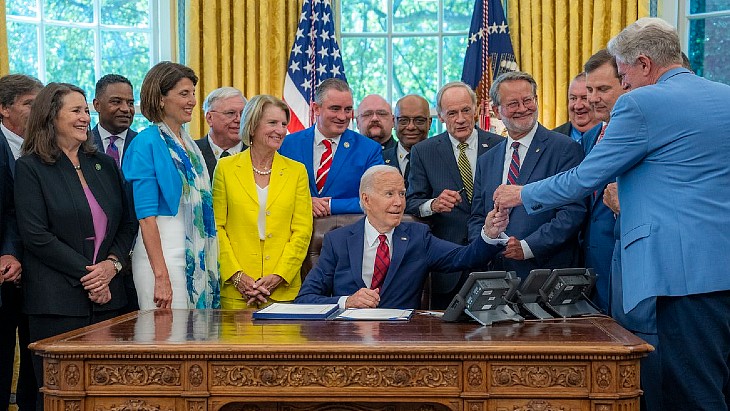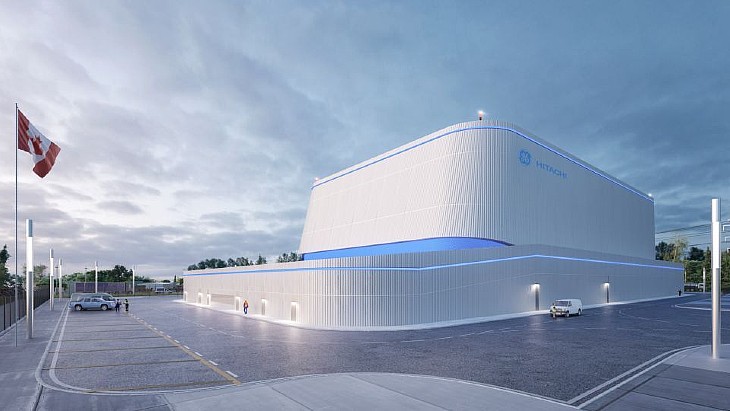IAEA finds Fukushima water sampling meets requirements
.jpg)
At the site, contaminated water - in part used to cool melted nuclear fuel - is treated by the Advanced Liquid Processing System (ALPS), which removes most of the radioactive contamination, with the exception of tritium. This treated water is currently stored in about 1000 tanks on site. The total tank storage capacity amounts to about 1.37 million cubic metres and all the tanks are expected to reach full capacity in late 2023 or early 2024.
Japan announced in April 2021 it plans to discharge treated water stored at the site into the sea over a period of about 30 years, and asked the IAEA to review its plans against IAEA safety standards.
Consistent with relevant IAEA international safety standards, Tepco is required to monitor the characteristics and activity of the treated water in order to accurately evaluate public exposure due to the discharge and to comply with its national regulatory authorisation.
As part of its multi-annual safety review, the IAEA is independently checking the types and amounts of radionuclides contained in the ALPS treated water.
The IAEA has now released its latest report covering its independent sampling and analysis work. The IAEA observed and facilitated the collection of the treated water samples analysed in the report from tanks at the Fukushima Daiichi site in March 2022. This water was taken from the first batch of ALPS treated water expected to be discharged into the sea.
The samples were corroborated based on an interlaboratory comparison which involves different laboratories separately testing and analysing samples and then comparing results and procedures to determine their reliability and accuracy. The samples taken for the report were analysed by Tepco; by the IAEA in its laboratories in Monaco, and in Seibersdorf and Vienna, Austria; and in third-party laboratories in France, South Korea, Switzerland and the USA.
Additional samples have been taken from other batches of water and are undergoing a similar analysis as part of the wider review process.
"This report and the analytical results that it contains are an important milestone in the IAEA's safety review," said Gustavo Caruso, Director and Coordinator for the ALPS Safety Review, IAEA Department of Nuclear Safety and Security and Chair of the Task Force. "The data demonstrates Tepco's analytical performance through a transparent and rigorous scientific process."
Additional reports on corroboration will cover baseline environmental samples (eg seawater and fish) from the surrounding environment of the Fukushima Daiichi site and an assessment of the capabilities of monitoring services involved in the assessment of internal and external radiation exposure of workers at the plant.
The report was released as the IAEA Task Force conducting a safety review of Japan's plan to release treated water into the sea carries out its final mission to Japan before publication of the agency's comprehensive report.
During the mission - being held from 29 May to 2 June - the Task Force is meeting in Tokyo with Tepco, as well as with the Ministry of Economy, Trade and Industry and the Nuclear Regulation Authority (NRA).
"The Task Force will use this opportunity to receive updates from Tepco and the Government of Japan regarding their work over the past few months and to confirm our understanding of different technical details – this will help us as we prepare the comprehensive assessment of the safety of Japan's plan for the water release," Caruso said.
The IAEA's comprehensive report will include a broad assessment of Japan's plan to discharge the treated water against relevant international safety standards, factoring in all insights and outcomes from all previous missions. Japan intends to start discharging the ALPS treated water in 2023 having received the NRA's regulatory approval for the plan in May last year.
South Korean inspection
Last week, a team of South Korea experts visited the Fukushima Daiichi site to inspect equipment and facilities to be used in the discharge process. The team comprised 21 experts from the Korea Institute of Nuclear Safety and the Korea Institute of Ocean Science and Technology.
In a statement, Korea's Nuclear Safety and Security Commission said: "This visit focused on matters requiring on-site confirmation as part of the scientific and technological review process that the Korean government has been conducting since August 2021."
The team inspected the plant's treatment facilities, such as ALPS, and the K4 tanks storing the treated water. They also inspected the mechanisms of the underwater tunnel to be used for discharging the treated water into the sea.
"This visit has made significant progress in the process of scientific and technological review through direct on-site confirmation and more detailed data acquisition, but additional analysis and confirmation work is planned for more precise judgment," Yoo Gook-hee, head of the inspection team said. "Based on this, we plan to comprehensively evaluate Japan's plans for Fukushima-related water pollution and disclose the results."










_88592.jpg)

